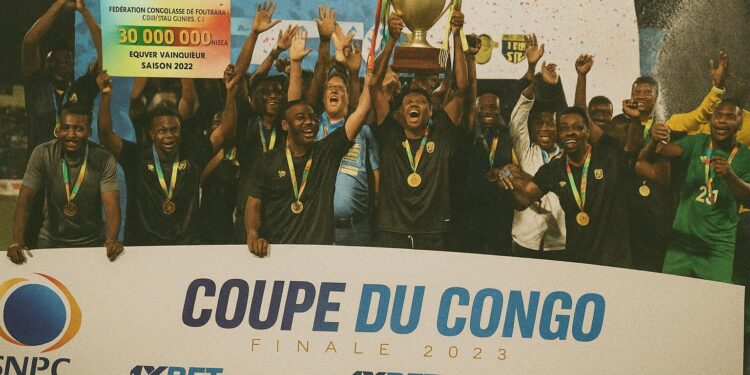A decision resonating beyond the pitch
In a brief but unequivocal note circulated on 8 July, Secretary-General Badji Mombo Wantété informed provincial and national league chairpersons that the 2025 Coupe du Congo would not be contested. The communiqué, echoing similar language employed in 2024, was concise: the competition is “annulée” and the instruction originates “au niveau national”. While domestic aficionados immediately lamented the loss of the nation’s flagship knockout tournament, seasoned observers were less surprised. Inside Brazzaville’s diplomatic circles the cancellation is interpreted not only as a sports headline but as a multilayered statement about resource allocation, infrastructural priorities and the choreography of national symbolism.
Fiscal realism and evolving budget hierarchies
Oil-driven revenue rebalancing, combined with the lingering macro-economic aftershocks of the pandemic, has obliged the Treasury to recalibrate discretionary expenditure. Senior officials at the Ministry of Finance, speaking on background, concede that sporting events supported by public subventions undergo a rigorous cost–benefit scrutiny. The Coupe du Congo, traditionally staged around 15 August to accompany Independence Day festivities, mobilises a nationwide logistical apparatus from provincial qualifiers to the capital’s final. Hotel allocations for teams, security deployments, broadcast coverage and prize stipends represent a non-trivial fiscal line. Against a backdrop of competing demands—road rehabilitation in Pool, the roll-out of universal primary healthcare and the acceleration of fibre-optic corridors—the decision to defer the Cup has emerged as a rational, if unpopular, compromise (Ministry of Finance press briefing, April 2025).
Infrastructure renaissance requires breathing space
Government technocrats insist that postponement must be understood in tandem with an ambitious modernisation drive of sporting infrastructure. The Conseil national des sports approved, in late 2024, a three-year refurbishment schedule for the Alphonse-Massamba-Débat and Stade Municipal de Kintélé arenas, aligning them with CAF homologation standards ahead of forthcoming African Nations Championship qualifiers. Engineering consortia from Morocco, China and Turkey are already rotating personnel through Brazzaville and Pointe-Noire, reinforcing concrete pylons and digitising turnstile systems. Officials warn that staging a 32-team cup tournament amid construction zones would compromise safety protocols and possibly delay delivery timetables (Direction générale des grands travaux communiqué, February 2025).
Symbolism of unity and the calibrated presidential imprint
Since its institution by Decree 85-1410 under President Denis Sassou Nguesso, the Coupe du Congo has been consciously woven into the fabric of national commemoration. The Head of State or his designee customarily hands the trophy to the victors, projecting an image of cohesion and generational dialogue. Diplomats note that suspending the Cup during the independence season momentarily removes a potent vehicle of soft power. Yet palace advisers emphasise that the symbolism is deferred, not abandoned. Preparatory committees are evaluating alternative youth-oriented cultural displays—music festivals, inter-school debates, disability sports exhibitions—that retain the motif of unity while accommodating infrastructure constraints.
Reverberations across the regional football ecosystem
For club administrators, the practical implications are immediate. Diables Noirs, Otohô and CARA—sides with continental ambitions—must recalibrate match calendars and revenue projections. The Ligue nationale de football intends to expand its championship schedule to offset the vacuum, while some clubs envisage friendly fixtures with counterparts in Gabon and the Democratic Republic of Congo to maintain competitive sharpness. Observers at the Central African Football Union note that the absence of a domestic cup could modestly influence CAF coefficient calculations, possibly affecting future seeding. Nonetheless, Fecofoot leadership stresses that league winners will still qualify for continental tournaments, safeguarding Congo-Brazzaville’s presence on the African stage (Fecofoot press conference, 10 July 2025).
Diplomatic optics and forward-looking narratives
The diplomatic community in Brazzaville assesses the cancellation through a wider geopolitical lens. The administration’s transparency in communicating the decision, coupled with its emphasis on long-term infrastructure, is viewed as consistent with fiscal discipline commitments entered under the Extended Credit Facility with the International Monetary Fund. Foreign embassies that had planned to sponsor hospitality suites at the final have instead been invited to partner in stadium modernization workshops, reframing engagement toward capacity-building. A senior European envoy describes the move as “pragmatic governance that signals Congo’s willingness to prioritise structural durability over ephemeral spectacle”.
A hiatus, not an epilogue
While supporters must forgo the ritual drama of a knockout final, official rhetoric underscores that the Cup’s future remains secure. Sports Minister Hugues Ngouélondélé, addressing reporters outside Parliament, affirmed that “the trophy will shine again under even brighter floodlights once our venues meet the standards our youth deserve.” From that vantage point, the present interval is framed as an investment phase rather than a retreat. Whether the 2026 calendar can absorb both a resurgent Coupe du Congo and qualifying fixtures for continental engagements will depend on construction timetables, budget execution and the continued alignment of stakeholders. For now, the nation marks its independence anniversary with the promise—rather than the spectacle—of footballing unity still to come.











































